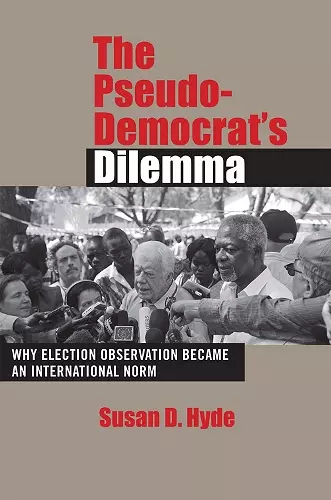The Pseudo-Democrat's Dilemma
Why Election Observation Became an International Norm
Format:Paperback
Publisher:Cornell University Press
Published:5th May '15
Currently unavailable, and unfortunately no date known when it will be back
This paperback is available in another edition too:
- Hardback£32.00(9780801449666)

Why did election monitoring become an international norm? Why do pseudo-democrats—undemocratic leaders who present themselves as democratic—invite international observers, even when they are likely to be caught manipulating elections? Is election observation an effective tool of democracy promotion, or is it simply a way to legitimize electoral autocracies? In The Pseudo-Democrat’s Dilemma, Susan D. Hyde explains international election monitoring with a new theory of international norm formation. Hyde argues that election observation was initiated by states seeking international support. International benefits tied to democracy give some governments an incentive to signal their commitment to democratization without having to give up power. Invitations to nonpartisan foreigners to monitor elections, and avoiding their criticism, became a widely recognized and imitated signal of a government’s purported commitment to democratic elections.
Hyde draws on cross-national data on the global spread of election observation between 1960 and 2006, detailed descriptions of the characteristics of countries that do and do not invite observers, and evidence of three ways that election monitoring is costly to pseudo-democrats: micro-level experimental tests from elections in Armenia and Indonesia showing that observers can deter election-day fraud and otherwise improve the quality of elections; illustrative cases demonstrating that international benefits are contingent on democracy in countries like Haiti, Peru, Togo, and Zimbabwe; and qualitative evidence documenting the escalating game of strategic manipulation among pseudo-democrats, international monitors, and pro-democracy forces.
This book tackles an interesting puzzle: Why would pseudo-democrats invite international election observers and cheat in front of them if getting caught is costly? A norm has developed because of leaders' attempts to signal to the international community their democratic credentials, even if they are not really committed to democracy. Susan D Hyde establishes a strategic tension for pseudo-democrats that is straightforward and compelling, and she provides an impressive array of empirical evidence to support her claims: cross-national time-series data, within-country experimental evidence, and qualitative accounts from hundreds of observer reports. The Pseudo-Democrat’s Dilemma is a must-read for those interested in elections and the development of norms.
* Perspectives on Politi- Winner of •Cowinner, 2011 Chadwick F. Alger Prize (Internati.
ISBN: 9780801456763
Dimensions: 229mm x 152mm x 19mm
Weight: 454g
264 pages